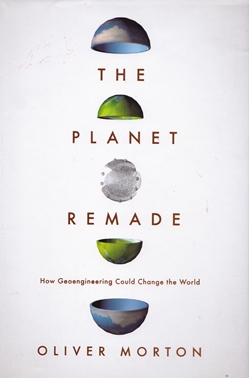
‘Geoengineering’ is a term created to encompass human actions taken to alter the Earth’s climate deliberately – i.e., where altering the climate is the point, rather than a side-effect. (We already have enough of those.) Its coinage has annoyed engineering geologists, but that’s not the half of it. I confess that the whole subject, and most of the scientists who profess it, give me the creeps.
On the whole, geoscientists and ‘geoengineers’ do not mix. Folk who dream of brightening clouds, or lofting reflective aerosols into the stratosphere, or floating billions of ping-pong balls on the oceans (yes, that’s a real one) tend (on the whole) to come from disciplines allied to physics and chemistry, and the ‘military-industrial complex’. Armed with the ‘first-principles’ arrogance typical of this breed, they tend to march all over Earth System Science confident, one suspects, that it can all easily be sorted out now they have arrived. Or at least, that’s the caricature. Professor Bill McGuire (UCL), calls them ‘The ‘Are You Feeling Lucky?’ brigade’.
Most Geoscientist readers, I suspect, would concur. In a risk-averse age that has lost its admiration for what Morton refers to (in Simon Schaffer’s phrase) as ‘Promethean science’, with its grandiose 1930s-style improving-on-nature ambition, no government or assemblage of them is ever going to sanction ‘geoengineering’ until it’s really too late, and for all the reasons Morton cites in his analysis. Yet, he remains hopeful.
In the hands of a lesser writer, this book could have been merely an entertaining litany of bonkers science fiction schemes, such as often make ‘GIANT UMBRELLAS IN SPACE’ headlines from geoengineering conferences. Instead, based upon deep engagement with the subject since the early 1990s, he has produced a thoughtful and thought-provoking analysis of whether deliberate climate modification is feasible, whether it should be actively considered and pursued alongside mitigation (he believes it should), and a penetrating analysis of the political situations in which it might be deployed, and to which it might in turn give rise.
Morton is well aware of the difficulties, but remains attracted to the possibility. He places geoengineering within the context of an ‘Anthropocene’ where (let’s face it) nothing outside the aisles of a supermarket is ‘100% natural’ any more. Indeed, he waxes lyrical about a time perhaps not too distant when geoengineering not only helps us regulate temperature, precipitation, ocean pH and so on, but where the presence of our hands on the levers will signify that a long-lived and false division between the ‘human’ and the ‘natural’ has finally been expunged.
In the end, I feel his vision places too much confidence in science and the capacities of societies and individuals to cope with being in control. But I come away with a better understanding of where geoengineering ideas have come from and (perhaps) a slightly less jaundiced view of those who cling to them. The book is full-on; I found myself yearning for some change of pace, tone or register. By the time one arrived, it was almost over. It feels like being cornered at a party by an intense acquaintance: a party at which you might have had more fun with someone else, but from which you come away much better informed, still unconvinced, and not a little sobered. Morton has written a very good book about what I still believe is a very bad subject.
Reviewed by Ted Nield
THE PLANET REMADE – HOW GEOENGINEERING COULD CHANGE THE WORLD by OLIVER MORTON. Granta Books 2015. ISBN 978 1 78378 095 2 (hbk). W: http://grantabooks.com/the-planet-remade.